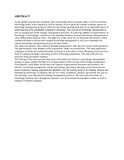| dc.description.abstract | As the global economy fast transitions into a knowledge-based economy, there is need
to develop a knowledge policy at the national as well as industry level to guide the
various economic agents on knowledge management in Kenya. Effective knowledge
management may be an important source of achieving long term sustainable
competitive advantage. The concept of knowledge management is now an integral
part of the strategic management processes of a growing number of organizations, as
knowledge is increasingly considered as an important business asset and knowledge
management as a key differentiator between firms. The objective of this study was to
determine the extent to which commercial banks in Kenya have adopted knowledge
management as well as to determine the various knowledge management practices by
these banks.
The study used primary data collected through questionnaires with open and closed
ended questions. The questionnaires were dropped at the respondents’ banks and
picked later. The study population comprised of all the 44 commercial banks in
Kenya as at the time of study. Responses were received from 28 commercial banks,
translating to 64% of the target population. The data collected was analyzed using
descriptive statistics.
The findings of the study revealed that most of the banks did not have a knowledge
management strategy in place, despite the high level of appreciation of the concept of
knowledge management. Consequently, most banks did not have the requisite
organizational structures and resources for effective knowledge management. On-the-
job training, particularly through social interaction and shared experience among
organizational members, was the leading mode of developing, sharing and distributing
knowledge. In addition, the use of e-mails, telephones, intranet, job rotation and oneto-one
meetings, were important knowledge management practices. The most relevant
modes of knowledge retention were through best practices, use of document
management systems as well as employee retention strategies. | en |


